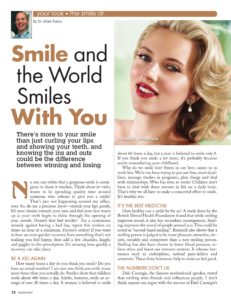There’s more to your smile than just curling your lips and showing your teeth, and knowing the ins and outs could be the difference between winning and losing
No one can refute that a gorgeous smile is contagious to those it touches. Think about it—who wants to be spending quality time around someone who refuses to give you a smile? That’s just not happening around my office, ever. So, do me a precious favor—stretch your lips gently, lift your cheeks towards your eyes and feel your face warm up as your teeth begin to shine through the opening of your mouth. Doesn’t that feel terrific? For a continuous remedy against having a bad day, repeat this motion six times an hour at a minimum. Doctor’s orders! If you want to have an even quicker recovery from something that’s not making you feel happy, then add a few chuckles, laughs and giggles to this prescription. It’s amazing how quickly a recovery can take place.
Be a Kid Again
How many times a day do you think you smile? Do you have an actual number? I am sure you think you smile many more times than you actually do. Studies show that children smile about 400 times a day. Adults, however, smile an average of over 20 times a day. A woman is believed to smile about 60 times a day, but a man is believed to smile only 8. If you think you smile a lot more, it’s probably because you’re remembering your childhood.
Why do we smile less? Stress in our lives causes us to smile less. We’re too busy trying to put out fires, meet deadlines, manage studies or programs, plan things and deal with relationships. Who has time to smile? Children don’t have to deal with these stresses in life on a daily basis. That’s why we all have to make a concerted effort to smile. It’s healthy, too.
It’s the Best Medicine
How healthy can a smile be for us? A study done by the British Dental Health Foundation found that while smiling improves mood, it also has secondary consequences. Smiling improves the mood of people around you. This could be noted as “second-hand smiling”. Research also shows that a smiling person is judged to be more pleasant, attractive, sincere, sociable and competent than a non-smiling person. Smiling has also been shown to lower blood pressure, relieve stress and boost our immune systems. It releases hormones such as endorphins, natural pain-killers and serotonin. These three hormones help to make us feel good.
The Numbers Don’t Lie
Dale Carnegie, the famous motivational speaker, stated that smiling wins friends and influences people. I don’t think anyone can argue with the success of Dale Carnegie’s teachings. There’s more to your smile than just curling your lips and showing your teeth, and knowing the ins and outs could be the difference between winning and losing. There are statistics that show how a smile can be an asset. In fact, 99.7% of adults say that an attractive smile is an important personal asset.
Do you believe you have an attractive smile? 74% of adults believe that an unattractive smile can hurt a person’s chance for success. Is your smile contributing to your mixed results with business or career success? Only 63% of people say they look best in photos when they show their teeth for a photograph. How do your photographs look to you? Your smile should be winning friends and influencing people.
To read the rest of the Smile Dr. feature… Click Here
To subscribe to Pageantry magazine… Click Here
To follow Pageantry magazine on Instagram… Click Here
To follow Pageantry magazine on FaceBook… Click Here


